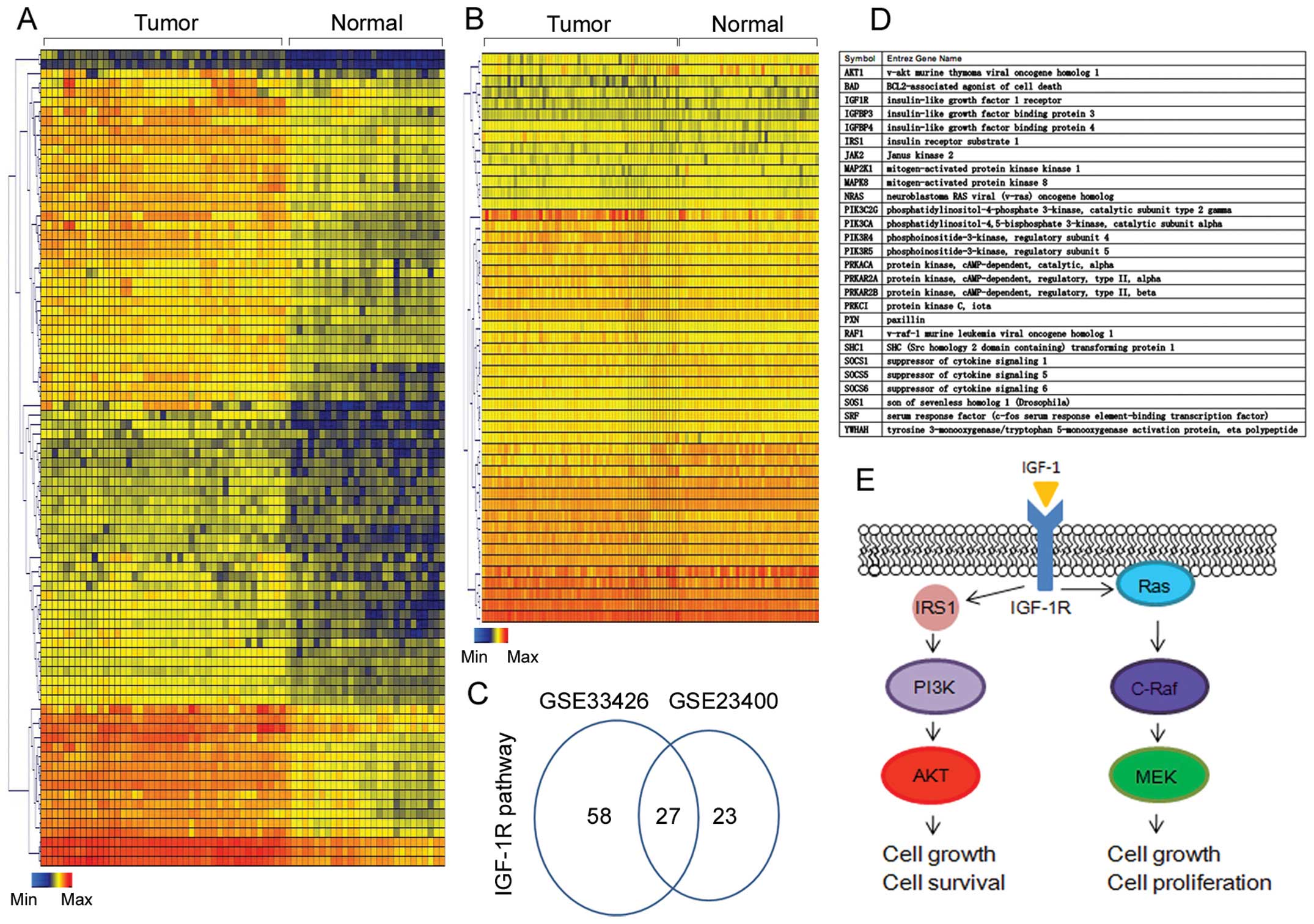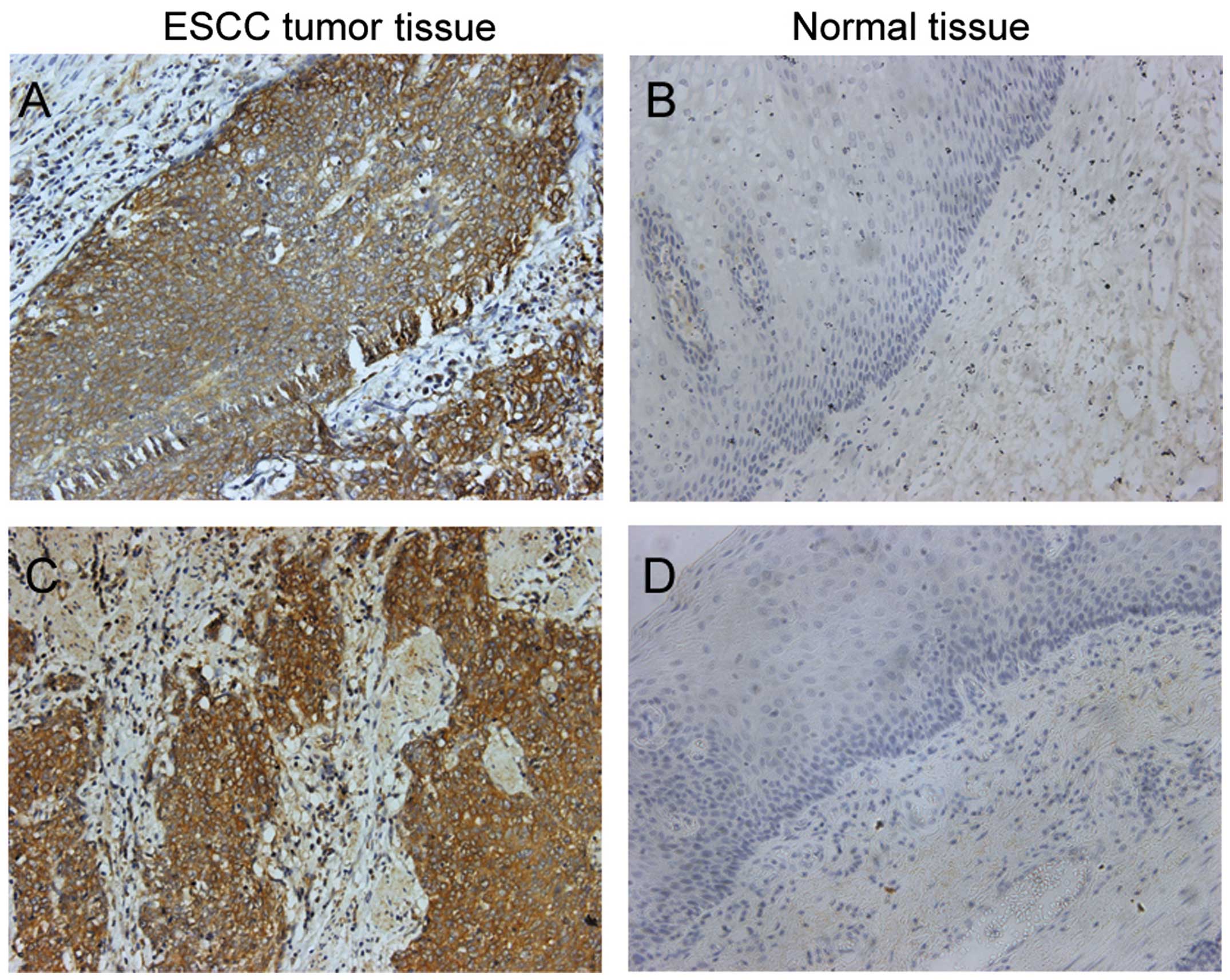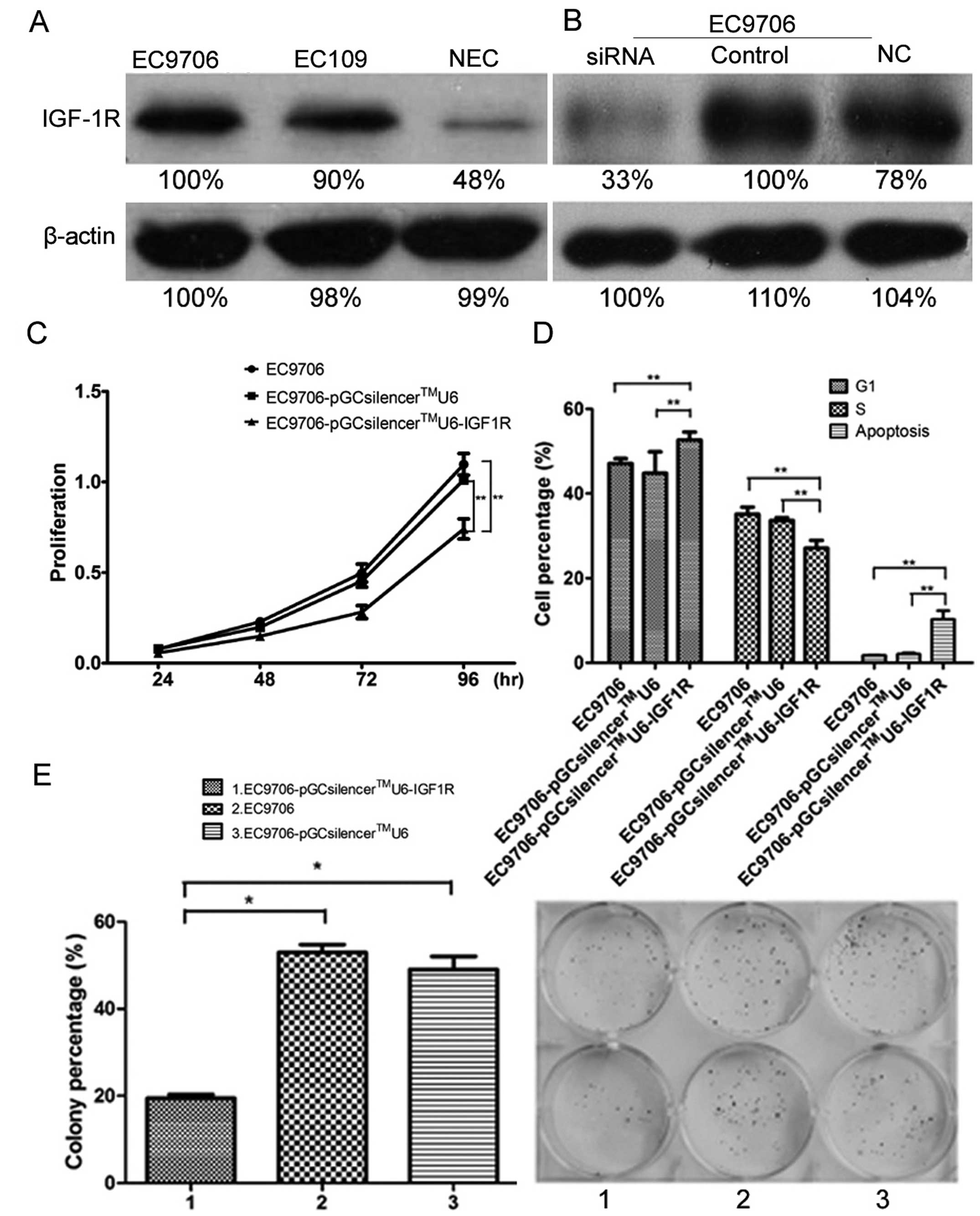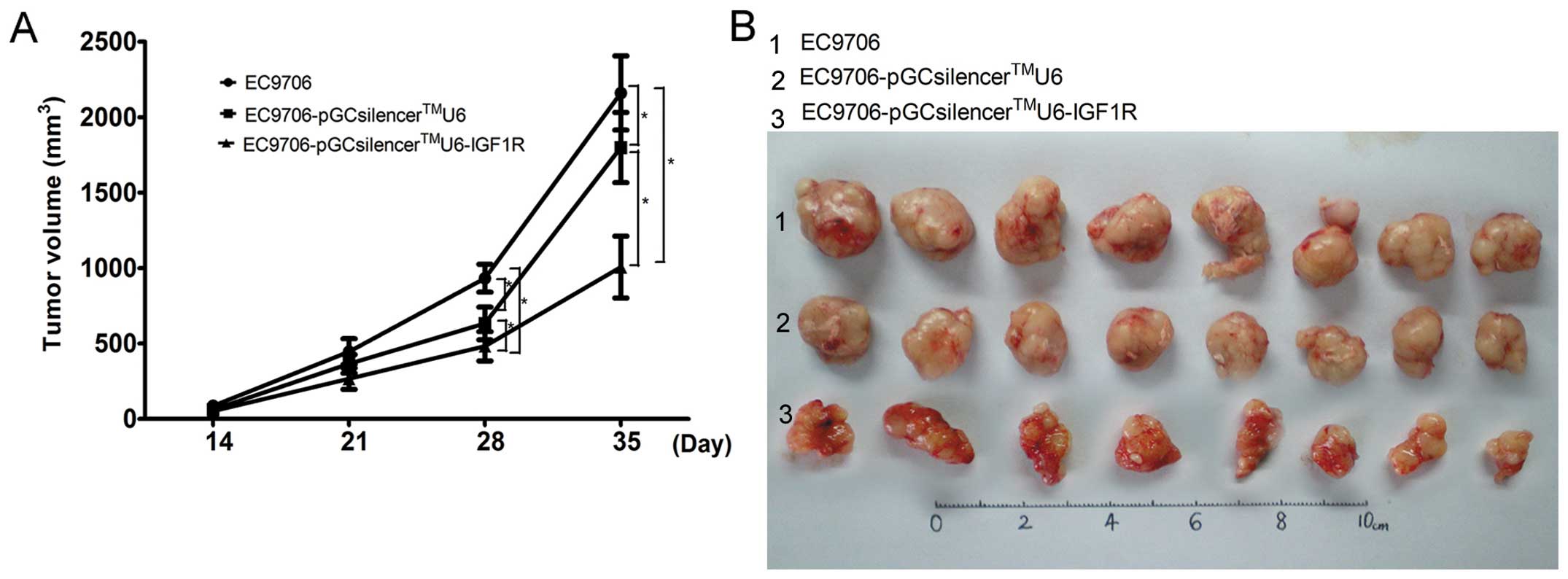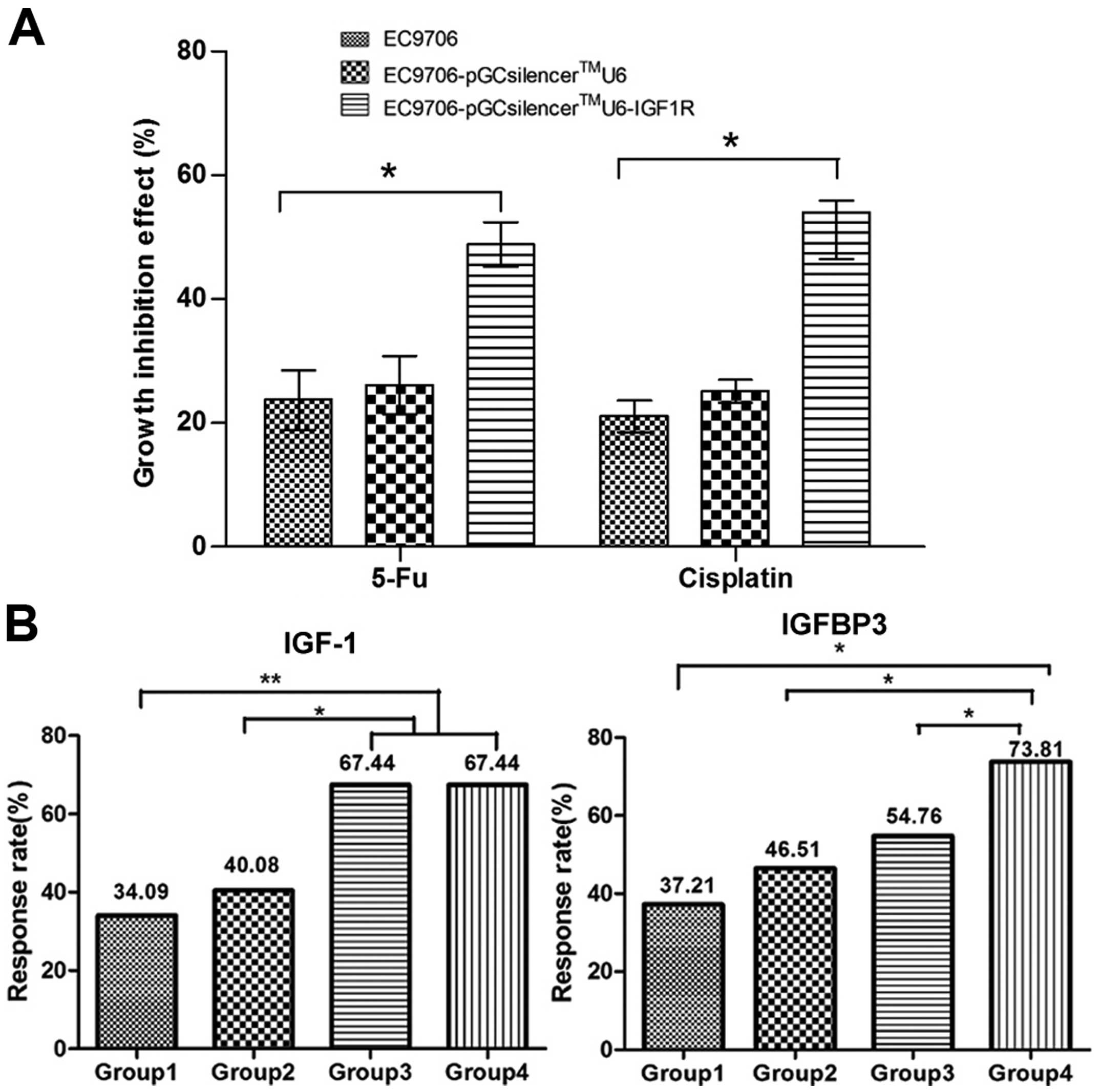|
1
|
Jemal A, Bray F, Center MM, et al: Global
cancer statistics. CA Cancer J Clin. 61:69–90. 2011. View Article : Google Scholar
|
|
2
|
He J, Gu D, Wu X, et al: Major causes of
death among men and women in China. N Engl J Med. 353:1124–1134.
2005. View Article : Google Scholar : PubMed/NCBI
|
|
3
|
Stoner GD and Gupta A: Etiology and
chemoprevention of esophageal squamous cell carcinoma.
Carcinogenesis. 22:1737–1746. 2001. View Article : Google Scholar : PubMed/NCBI
|
|
4
|
Qi YJ, Chao WX and Chiu JF: An overview of
esophageal squamous cell carcinoma proteomics. J Proteomics.
75:3129–3137. 2012. View Article : Google Scholar : PubMed/NCBI
|
|
5
|
Holmes RS and Vaughan TL: Epidemiology and
pathogenesis of esophageal cancer. Semin Radiat Oncol. 17:2–9.
2007. View Article : Google Scholar : PubMed/NCBI
|
|
6
|
Lin Q, Gao XS, Qiao XY, et al: Phase I
trial of escalating-dose cisplatin with 5-fluorouracil and
concurrent radiotherapy in Chinese patients with esophageal cancer.
Acta Med Okayama. 62:37–44. 2008.PubMed/NCBI
|
|
7
|
Liao Y, Abel U, Grobholz R, et al:
Up-regulation of insulin-like growth factor axis components in
human primary prostate cancer correlates with tumor grade. Hum
Pathol. 36:1186–1196. 2005. View Article : Google Scholar : PubMed/NCBI
|
|
8
|
Tsuta K, Mimae T, Nitta H, et al:
Insulin-like growth factor-1 receptor protein expression and gene
copy number alterations in non-small cell lung carcinomas. Hum
Pathol. 44:975–982. 2013. View Article : Google Scholar : PubMed/NCBI
|
|
9
|
Rikhof B, de Jong S, Suurmeijer AJ, Meijer
C and van der Graaf WT: The insulin-like growth factor system and
sarcomas. J Pathol. 217:469–482. 2009. View Article : Google Scholar : PubMed/NCBI
|
|
10
|
Ucar DA, Magis AT, He DH, et al:
Inhibiting the interaction of cMET and IGF-1R with FAK effectively
reduces growth of pancreatic cancer cells in vitro and in vivo.
Anticancer Agents Med Chem. 13:595–602. 2013. View Article : Google Scholar : PubMed/NCBI
|
|
11
|
Jia Y, Zhang Y, Qiao C, et al: IGF-1R and
ErbB3/HER3 contribute to enhanced proliferation and carcinogenesis
in trastuzumab-resistant ovarian cancer model. Biochem Biophys Res
Commun. 436:740–745. 2013. View Article : Google Scholar : PubMed/NCBI
|
|
12
|
Sharmila G, Bhat FA, Arunkumar R, et al:
Chemopreventive effect of quercetin, a natural dietary flavonoid on
prostate cancer in in vivo model. Clin Nutr. Sep 3–2013.(Epub ahead
of print). View Article : Google Scholar
|
|
13
|
Wilson S and Chia SK: IGF-1R inhibition:
right direction, wrong pathway? Lancet Oncol. 14:182–183. 2013.
View Article : Google Scholar : PubMed/NCBI
|
|
14
|
Zhao X, Dou W, He L, et al: MicroRNA-7
functions as an anti-metastatic microRNA in gastric cancer by
targeting insulin-like growth factor-1 receptor. Oncogene.
32:1363–1372. 2013. View Article : Google Scholar : PubMed/NCBI
|
|
15
|
Werner H and Bruchim I: The insulin-like
growth factor-I receptor as an oncogene. Arch Physiol Biochem.
115:58–71. 2009. View Article : Google Scholar : PubMed/NCBI
|
|
16
|
Wei Z, Hurtt R, Gu T, et al: GRK2
negatively regulates IGF-1R signaling pathway and cyclins’
expression in HepG2 cells. J Cell Physiol. 228:1897–1901.
2013.PubMed/NCBI
|
|
17
|
Fürstenberger G, Senn E, Morant R,
Bolliger B and Senn HJ: Serum levels of IGF-1 and IGFBP-3 during
adjuvant chemotherapy for primary breast cancer. Breast. 15:64–68.
2006.PubMed/NCBI
|
|
18
|
Ozkan EE: Plasma and tissue insulin-like
growth factor-I receptor (IGF-IR) as a prognostic marker for
prostate cancer and anti-IGF-IR agents as novel therapeutic
strategy for refractory cases: a review. Mol Cell Endocrinol.
344:1–24. 2011. View Article : Google Scholar
|
|
19
|
Thariat J, Bensadoun RJ, Etienne-Grimaldi
MC, et al: Contrasted outcomes to gefitinib on tumoral IGF1R
expression in head and neck cancer patients receiving postoperative
chemoradiation (GORTEC trial 2004-02). Clin Cancer Res.
18:5123–5133. 2012. View Article : Google Scholar
|
|
20
|
Peled N, Wynes MW, Ikeda N, et al:
Insulin-like growth factor-1 receptor (IGF-1R) as a biomarker for
resistance to the tyrosine kinase inhibitor gefitinib in non-small
cell lung cancer. Cell Oncol. 36:277–288. 2013. View Article : Google Scholar : PubMed/NCBI
|
|
21
|
Jones HE, Gee JM, Barrow D, et al:
Inhibition of insulin receptor isoform-A signalling restores
sensitivity to gefitinib in previously de novo resistant
colon cancer cells. Br J Cancer. 95:172–180. 2006. View Article : Google Scholar : PubMed/NCBI
|
|
22
|
Imsumran A, Adachi Y, Yamamoto H, et al:
Insulin-like growth factor-I receptor as a marker for prognosis and
a therapeutic target in human esophageal squamous cell carcinoma.
Carcinogenesis. 28:947–956. 2007. View Article : Google Scholar : PubMed/NCBI
|
|
23
|
Liu YC, Leu CM, Wong FH, et al: Autocrine
stimulation by insulin-like growth factor I is involved in the
growth, tumorigenicity and chemoresistance of human esophageal
carcinoma cells. J Biomed Sci. 9:665–674. 2002. View Article : Google Scholar : PubMed/NCBI
|
|
24
|
Dhillon AS, Hagan S, Rath O and Kolch W:
MAP kinase signalling pathways in cancer. Oncogene. 26:3279–3290.
2007. View Article : Google Scholar : PubMed/NCBI
|
|
25
|
Hanahan D and Weinberg RA: Hallmarks of
cancer: the next generation. Cell. 144:646–674. 2011. View Article : Google Scholar : PubMed/NCBI
|
|
26
|
Negi A, Ramarao P and Kumar R: Recent
advancements in small molecule inhibitors of insulin-like growth
factor-1 receptor (IGF-1R) tyrosine kinase as anticancer agents.
Mini Rev Med Chem. 13:653–681. 2013. View Article : Google Scholar : PubMed/NCBI
|
|
27
|
Soria JC, Massard C, Lazar V, et al: A
dose finding, safety and pharmacokinetic study of AVE1642, an
anti-insulin-like growth factor-1 receptor (IGF-1R/CD221)
monoclonal antibody, administered as a single agent and in
combination with docetaxel in patients with advanced solid tumours.
Eur J Cancer. 49:1799–1807. 2013. View Article : Google Scholar
|
|
28
|
Ioannou N, Seddon AM, Dalgleish A,
Mackintosh D and Modjtahedi H: Treatment with a combination of the
ErbB (HER) family blocker afatinib and the IGF-IR inhibitor,
NVP-AEW541 induces synergistic growth inhibition of human
pancreatic cancer cells. BMC Cancer. 13:412013. View Article : Google Scholar : PubMed/NCBI
|
|
29
|
Haluska P, Carboni JM, Loegering DA, et
al: In vitro and in vivo antitumor effects of the dual insulin-like
growth factor-I/insulin receptor inhibitor, BMS-554417. Cancer Res.
66:362–371. 2006. View Article : Google Scholar : PubMed/NCBI
|
|
30
|
Ucar DA, Cox A, He DH, et al: A novel
small molecule inhibitor of FAK and IGF-1R protein interactions
decreases growth of human esophageal carcinoma. Anticancer Agents
Med Chem. 11:629–637. 2011. View Article : Google Scholar : PubMed/NCBI
|















